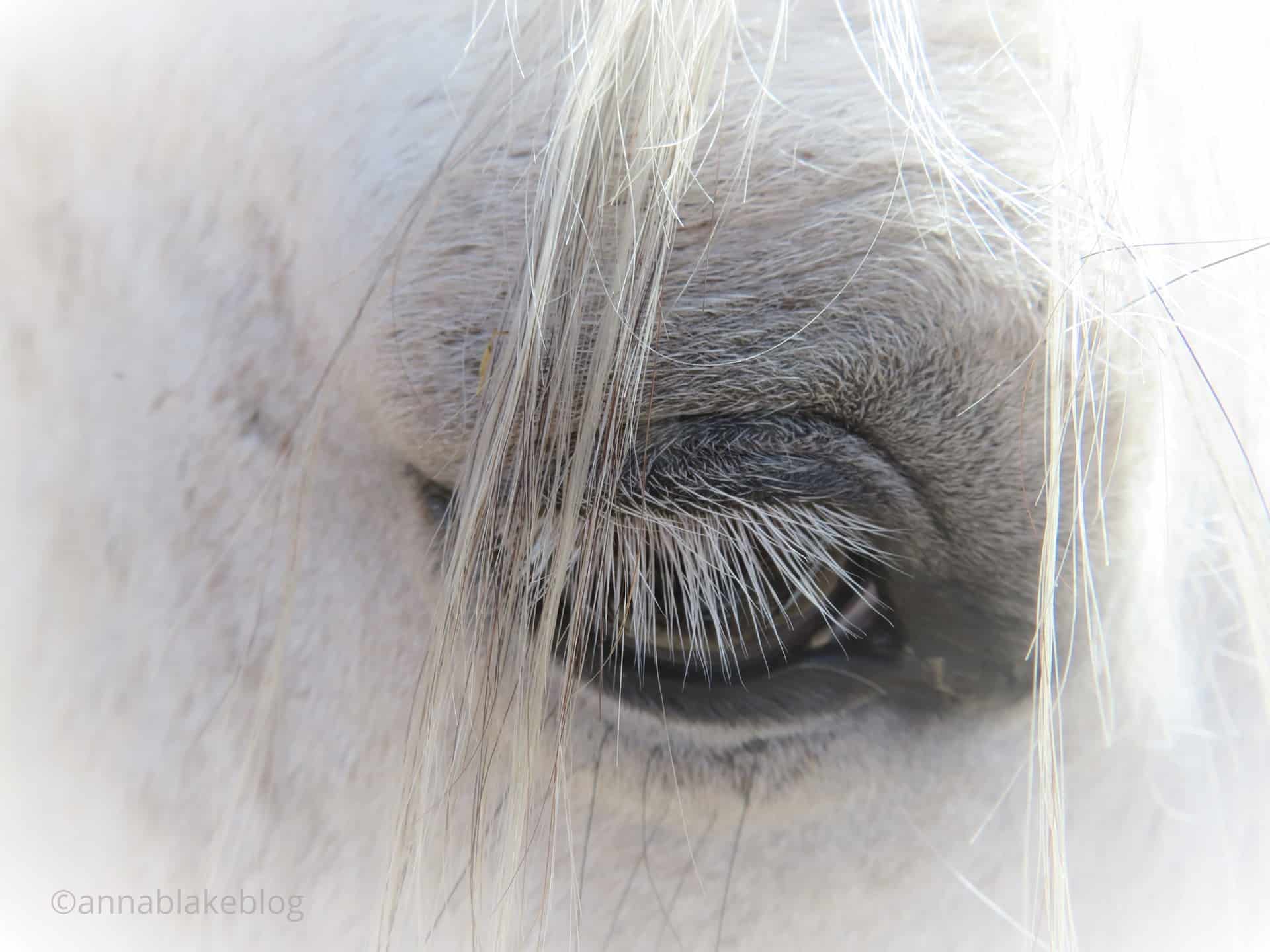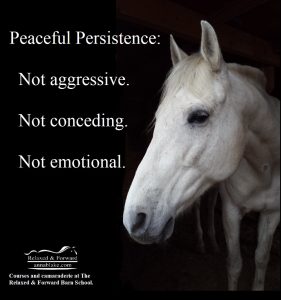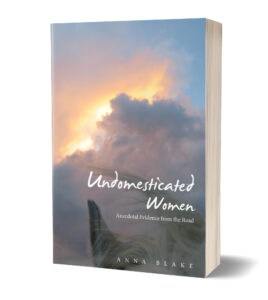
The mare would not pick up the canter. She just wouldn’t. In her defense, the rider was off balance. Every time the rider prepared for the canter, she’d launched herself forward a little out of the saddle. Almost like pumping on a swing, and the horse would slow down. I’m pretty sure the mare thought her rider was coming off. It’s noticeable when our sit bones aren’t where they’re supposed to be and common sense to proceed with care. The mare could have flung her rider into the clouds, but she chose not to.
In a parallel universe, her rider and I were in a lesson. We had worked hard to get to this place. It required a trot that made the canter possible, and the rider had struggled with fear. We both thought that anxiety was mostly behind her so this was a big day.
When I got this anxious and excited, my mentor would tell me I had too much blood in my eyes. It was her quaint way of letting me know I was trying too hard, hadn’t taken a breath in ten minutes, and was being insufferable. In hindsight, I know she was translating.
Now my client was so exasperated that she moany-whined her mare’s name, enunciating it out to two syllables. Kind of the way a kid will pronounce, “Mo-om.” She was almost in tears and our eyes met. She from the height of her saddle and me down in the sand. I gave a tiny smile, and she cracked up. Like every rider hasn’t muttered something just that way, frustrated, infuriated, and petulant. Like a canter is a rare bird in the Amazon jungle and not something the mare does every day without a thought.
We have all been there. It’s the day we want that the immense love we shower on our horse to be worth something more. More than a mouth full of mane as the mare decelerates to a speed she thinks her human can handle. Horses don’t care what we think we deserve. Horses care about survival and it’s a good day when that includes their rider.
Still, we love horses. It goes without saying, but we say it. We love their eyes and the way their mane smells. When they are galloping in the pasture, our hearts catch in our throats, every single time. Same thing when they lift their heads from grazing to look at us. Besotted, we obsess about them, dead or alive. We are even smart enough to love a nice, firm pile of manure. We love them with a pink sparkly horse-crazy girl heart. They do not reciprocate that love. And we’re missing the point.
For the last decade, I’ve been writing about calming signals, teaching classes, doing clinics, and often listening to what no one wants to hear. At the same time, I continue to study and dive deeper into the attempt to understand the horse’s reality. I have been so immersed in their language that everything I read or see seems to go back to horses. Lately, I’m hung up on this quote:
“Perhaps one did not want to be loved so much as to be understood.” -George Orwell
Written in a different context, I still think it’s the truest thing I know about horses. I first learned it from working with troubled horses, but it’s just as important for confident weanlings. My love didn’t help them at all because it’s our nature to misunderstand them. We see them through human eyes. “Anthropomorphism is the attribution of human traits, emotions, or intentions to non-human entities. It is considered to be an innate tendency of human psychology.”
Horses don’t talk, so we must learn Calming Signals. It means becoming bilingual and using eyes more than voice. It means recognizing their emotions and allowing the time to resolve them. Calming signals aren’t a party trick, but a literal conversation the horse is trying to have, not unlike what he has with the herd. Calming signals are a language of nuance and there’s no reason to think we’d learn it any quicker than Latin. It takes focus to listen because we’ve gotten lazy daydreaming about unicorns. So much easier to love horses than to understand to them. More amusing to make up stories as if they were people in horse suits.
So, we blow through messages of anxiety, even after recognizing a calming signal. We push through to do what we want, noticing their emotions but paying little heed. Work them through it, we say to justify our impatience. But that won’t resolve anything for a horse who is afraid and in their flight response. We’ve just proven we’re not trustworthy.
Shouldn’t it be enough if people just loved them? The horse world would look different if that were true, but it isn’t. Too much abuse and too many horses bounced to rescue. But still horses continue to come to us when people have been cruel. They try for us when they know they might get in trouble. Or keep us in the saddle when we might not deserve it.
Even now, we’re coming at it from a human-centric position; what we want from them. Let’s switch sides.
Back to the mare in the lesson. She wasn’t being nasty. Lacking a frontal cortex, she isn’t capable of deceit; that’s an “executive function.” The mare wasn’t trying to get away. Horses know we’re safer in numbers. Horses move in synchrony and rhythm and usually in the same gait. She probably understood the canter cue, but then the rider gave her more cues erratically, probably punctuated by a thigh-master grip on her ribs. So, she was confused and stopped to sort it all out. Good advice, mares are so smart.
We need to learn more, so we can understand the horse’s viewpoint. For all the times they take care of us when we think we’re perfect, we should educate ourselves. As eloquent as we are about our love for horses, could we listen to them with more perception? And beyond that, put their mental well-being above our plans for the day.
But what about our martyred, woe-is-me, unrequited love, you ask? It plays a very crucial role. That wonderful passion is our gift to ourselves for caring for horses. For stacks of hay and vet bills, we shine with devotion. Love is the reward for our efforts and the place of our dreams. Love is the life raft that keeps us above water during the storms that will surely come.
…
Relaxed and Forward Training by Anna Blake is no longer on Facebook because of repeated hacking. If you or your horse appreciate my writing, please share, subscribe to this blog, or join us at The Barn School.
 The Barn School, is a social and educational site, along with member sharing and our infamous Happy Hour. Anna teaches courses like Calming Signals and Affirmative Training. Everyone’s welcome.
The Barn School, is a social and educational site, along with member sharing and our infamous Happy Hour. Anna teaches courses like Calming Signals and Affirmative Training. Everyone’s welcome.
Want more? Become a sustaining member, a “Barnie.” Subscribe to our online training group with affirmative demonstration videos, audio blogs, daily quotes, free participation in “group lessons”, and live chats with Anna. Become part of the most supportive group of like-minded horsepeople anywhere.
Visit annablake.com to find archived blogs, purchase signed books, schedule a live consultation, subscribe for email delivery of this blog, or ask a question about the art and science of working with horses.
Ride for a new brand, find our Relaxed and Forward swag at Zazzle.
Affirmative training is the fine art of saying yes.
…
 Available Now! My new travel memoir is Undomesticated Women, Anecdotal Evidence from the Road. Ride along on a clinic tour through 30 states, 2 oceans, and 14k miles with me and my dog, Mister. It is an unapologetic celebration of sunsets, horses, RV parks, roadkill, diverse landscapes, and undomesticated women. Available now at Amazon, Barnes and Noble, and signed copies from me.
Available Now! My new travel memoir is Undomesticated Women, Anecdotal Evidence from the Road. Ride along on a clinic tour through 30 states, 2 oceans, and 14k miles with me and my dog, Mister. It is an unapologetic celebration of sunsets, horses, RV parks, roadkill, diverse landscapes, and undomesticated women. Available now at Amazon, Barnes and Noble, and signed copies from me.
…
I hope this rider was able to move beyond her fear and really make a connection with this good mare.
This post really got to me – so many more thoughts on this, but no words come to mind.
Beautiful Anna
No worries, Maggie. They were wonderful partners for years until the good mare’s death. She taught her rider well.
That was just beautiful. I strive to be humble yet able to inspire confidence in my horses. I want them to feel safe yet free. Most of all, I just want to do right by them. Thank you, Anna, for helping me be the best keeper of horses that my horses could have. For reminding me how different we are and to seek common ground through understanding.
For making my late-in-life journey with horses more joyful than I ever imagined. The path you have steered me down is a world away from what my wildest dreams were and I’m grateful to have found it through you.
I’m just a sock puppet. Horses brought us both beyond our dreams… Thanks, Sueann
I look forward to your posts in my in-box every week. Thank you for continuing this tradition. My own gray mare thanks you for helping me be a better human for her.
As someone trained by grays, they thank you, Stacey.
The message to listen and learn from our horses is so critical, and can’t be over-stated. Your wisdom, conveyed in blogs like this and in lessons , has helped me so much along my horsemanship journey, especially in this late life stage I find myself in. Please keep writing on these matters ! As you say, it’s like learning Latin and we need much repetition.
I ran across this quote from Nora Roberts since reading this blog yesterday. ” Love is not enough. But , it is the rock on which all else stands.”
Sarah, thanks for this quote. I always know my love for horses is not returned in kind, but we feel such passion it must be for something. And that’s it. Love sustains us (and by extension, them) but not like we think. It is a dependable foundation for horse people…
“How do I love thee? Let me count the ways.
I love thee to the depth and breadth and height
My soul can reach…”
Thank you, Anna, for this wonderful essay.
What is my ulterior motive when I profess my love is a question I need to ask myself (and then demand an answer) before I try to convince my horse of my sincerity. I will be dusting off my mirror to take another look-see at where my love needs to be supported by a, so far, imperfect understanding.
Ulterior motive sounds so shady. If my love for horses wasn’t here, I might look nuts spending all this money on retired horses. Thanks Lynell. PS Quoting Shakespeare always makes me happy.